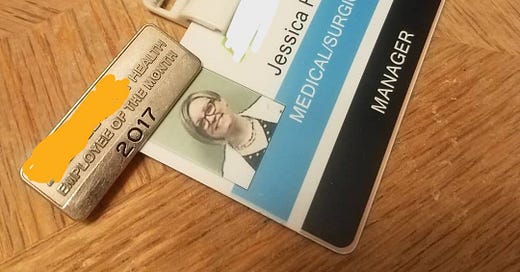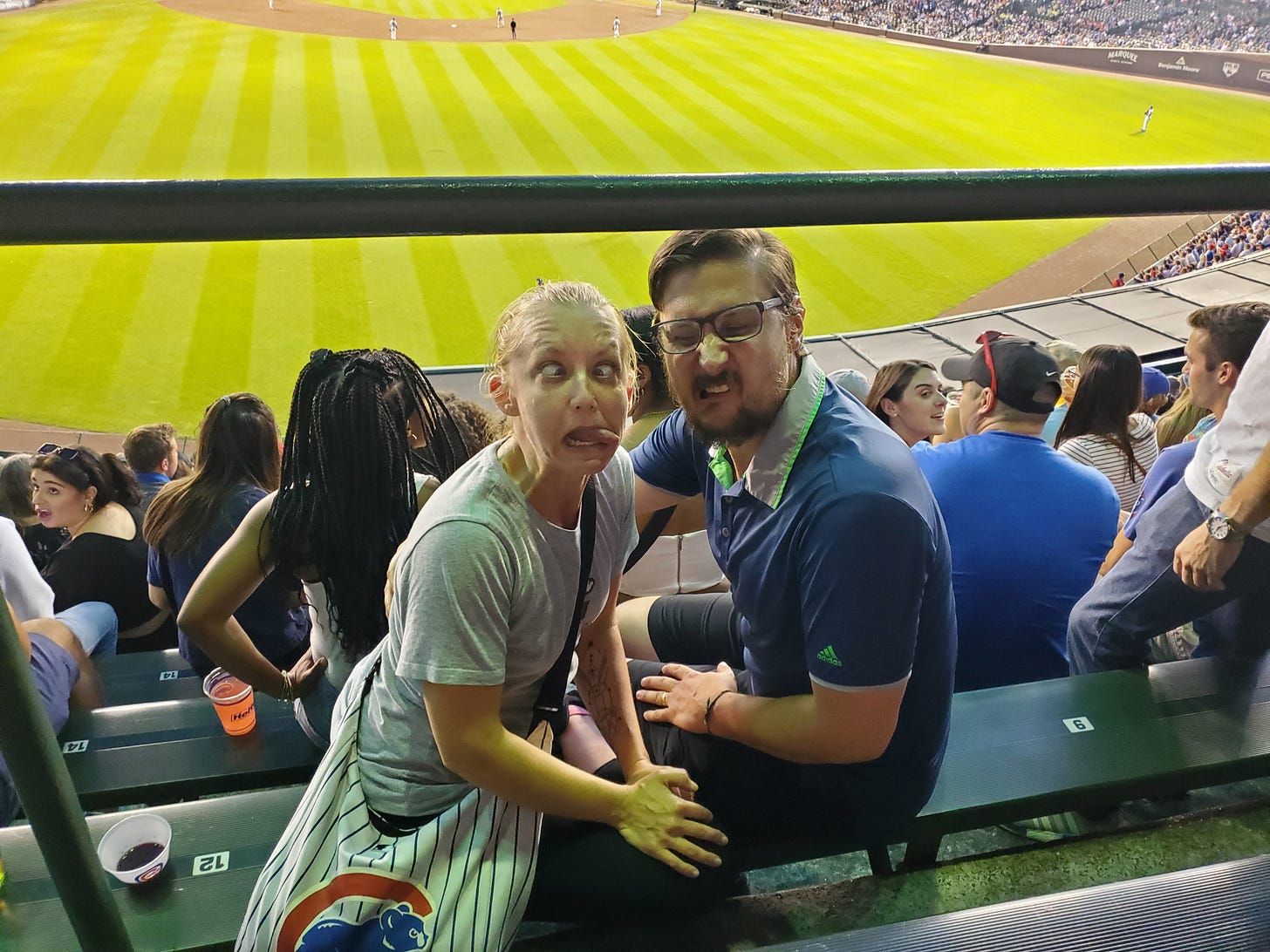When I go out in public wearing scrubs, also known as “a nurse uniform”, I’ve been asked what I do.
“I’m a nurse,” I reply.
“Oh, thank you for all that you do” is a response I often hear.
I appreciate the kind words, the thought behind them, and the consideration that I might do something deserving of this person’s appreciation. Without knowing anything else about me, except that I am “a nurse”, strangers sometimes feel called to thank me. It’s humbling. And hard to respond to. I find myself dismissing it, for whatever reason. Not dismissing their thanks, but struggling to accept it as directed at me. I consider that they’re thanking “nurses”, not just this nurse.
“What kind of nurse are you?”
“What kind of nurse?”
This one is a bit trickier to answer.
What kind of nurse am I right now? Or ever? From the beginning? Or most importantly? Where am I heading? Or where do I spend my day?
Similar to the question, “How are you” — I consider “how am I”, my relationship with the person asking, the amount of time they considered for my response, and the tangle of weeds I feel like traveling through at that moment. I also consider what answer they might be looking for. “Fine, thanks?” (Will any other response even make sense?)
The origin story behind “I’m a nurse” has many winding, tangential trails. The responses are very nuanced. So is, “I’m fine, thanks”.
I’m fine, thanks
I also consider what this new, momentary friend knows about Healthcare Work in general, and what being a “nurse” means in this context. Is “nurse” defined by what they saw on the show “Scrubs”, “Gray’s Anatomy”, or “ER”? Is it based on their great aunt who was a nurse in the 1970’s? Do they have baseline knowledge of what nurses do, the schooling requirements in the US, or the many, many roles that can be fulfilled by someone with that title?
“I work in home health”. That’s usually where I lose people, unless they’ve experienced it personally.
I choose my words based on the context of the conversation. And we part ways.
Out of Uniform
I don’t wear my scrubs often anymore. And I especially try not to wear them in public places. It seems to invite inquiry. Assumptions. The gratitude of strangers. Again, it’s humbling, but I find it uncomfortable.
Coming through the pandemic, though…
Wearing scrubs invites this look of… pity. Not pity, like, “look at that poor homeless puppy”. But pity, like, “wow, I wonder if she works in Healthcare. How brave”. Pity is defined as “the feeling of sorrow and compassion caused by the suffering and misfortune of others”. It’s a feeling, not just a 4-letter word.
“Robert’s been a little depressed, awwww”.
[Bo Burnham captures the sentiment I’m getting at in a way words can’t describe.] The way people feel when they meet a nurse during and after the pandemic. Or that’s the story I tell myself.
I’d rather just not go there right now, dear stranger. I don’t want you to think I’m a nurse the moment we meet. I want you to think I’m a human who is doing their best. I may not have answers to every health question. I’m not up to explaining how, though I’m a nurse, I’m not that kind of nurse (whichever one doesn’t do what you’re asking me about). You probably didn’t allot time for me to explain what kind of nurse I am now, and how I also have over a decade of other nursing experience from before (because imposter syndrome would have me believe I’m undeserving of a job I love).
Am I a nurse even out of my scrubs?
Am I a nurse out of the field?
Am I a nurse when I lay in bed?
Am I a nurse when I take a day off?
Am I a nurse when I can’t fucking sleep because I’m worried about the future of Healthcare?
Am I a nurse when I do sleep, then wake up hoping there’s enough time to clear my head before I start my work day?
I know that I am.
I am also so much more than just a nurse. I am.
I forget that very easily. And I’m reminding myself of that now.
I Work in Healthcare
Out of uniform, I’m incognito. My career choice comes up a bit more intentionally. Or not at all. Sometimes I’ll sprinkle in that I work in Healthcare, like when discussing the state of Modern American Healthcare and the path I see ahead of us. I have some familiarity with Healthcare systems and human bodies. It’s one of my talents, in addition to knitting, gardening, and playing guitar.
Maybe I should keep my nurseyness to myself and let people have their opinions and misconceptions. There’s no right answer.
The thing is, when I chose a path in a Healthcare field, I didn’t realize I was choosing a vocation. “It’s inculcated in all we do” — resonating from a nurse I welcomed in orientation. I never could have imagined that this “job” would come to define me in this way.
Right now, I’m the kind of nurse who gets to teach orientation. We often have conversations about people’s journeys leading them to this level of care at this Healthcare company. The stories I hear now are heartbreaking. Eye opening. Recurring.
More and more, I feel like I’m tending to the wounded after a long, quiet, confusing battle. A storm. Like a tornado that ripped through the woods. Few outsiders noticed the storm, fewer appreciate the hidden damage. And even fewer are seeking out the victims to provide comfort and care. The victims are here. They are quiet. And they are many.
The victims of the pandemic are not just the patients. And not just the nurses. We have unheard victims in the Healthcare Workforce at all levels of care and all disciplines. The wounded, disheartened Healthcare Workers are in the brambles. And with them, they bring their stories. Stories of short staffing. Of managers who punish when errors are made. Of coworkers who bully when call-offs happen. Of patients on COVID units being co-roomed whether or not they were sick with the same virus. Caring for a week’s worth of patients in one night. Holding tablets up at the bedside so families can video call with a dying patient. Masking smiles at all times for fear of missing any final moments with a loved one due to illness. Aggressive visitors intimidating staff, bullying them into submission. Workers fearing loss of license, income, or liberty due to errors while they are overworked, overstressed, and overwhelmed. Problems that were insipid before the pandemic, returning in full-force on an already strained front line. Further weakening the cracks in the foundation.
The cracks are where the light shines through. I can feel us all getting stronger. This is where I’m shining my light.
I’m not just a nurse. But also, yes, I am a nurse. And I’m listening.
Can you hear the call to us all?
Turn your light on.
Love,
Jessie
PS
What Light? Your light.





This one I could really relate to! From “identity” to imposter syndrome to challenges explaining home health.